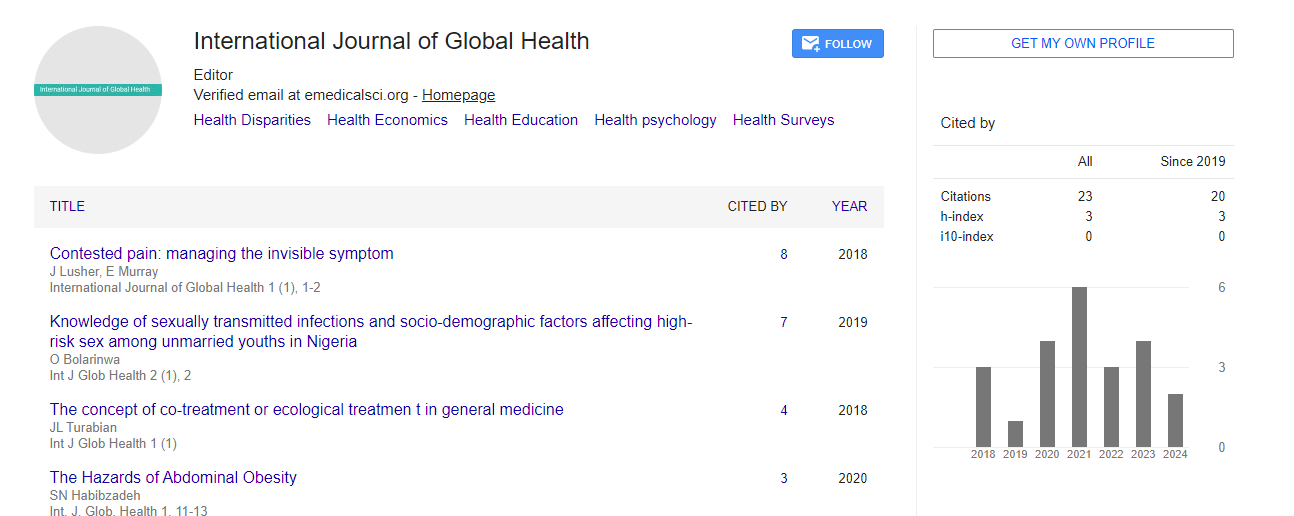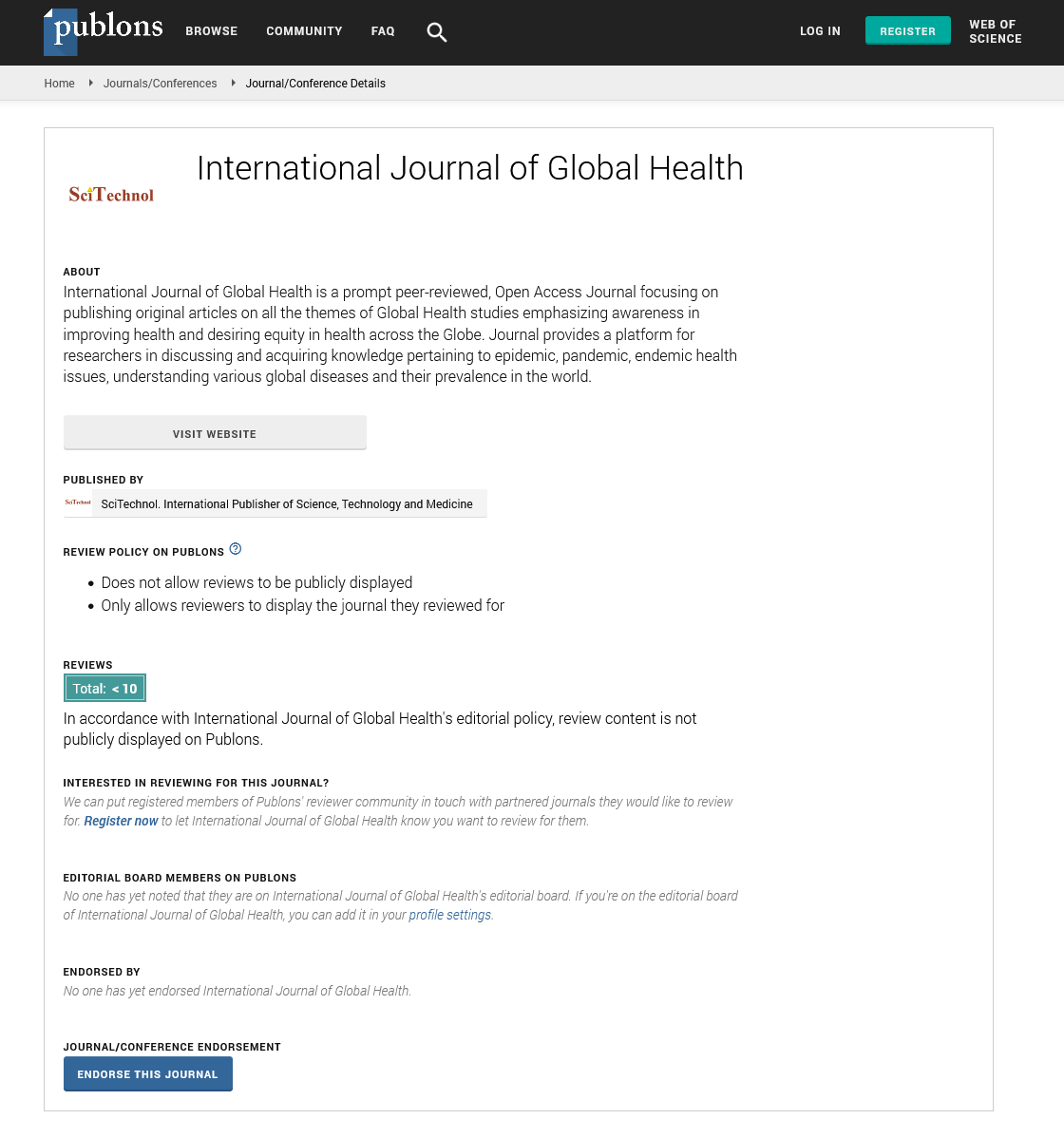Opinion Article, Int J Glob Health Vol: 6 Issue: 4
Health Inequities Across Borders: Bridging Gaps in Global Health
Johnston Burcu*
1Department of Global Epidemiology, Pacific Health Sciences Institute, Havenburg, USA
*Corresponding Author: Johnston Burcu,
Department of Global Epidemiology,
Pacific Health Sciences Institute, Havenburg, USA
E-mail: Johnston_burcu141@phsi.edu
Received date: 27 November, 2023, Manuscript No. IJGH-24-125957;
Editor assigned date: 29 November, 2023, Pre QC No. IJGH-24-125957 (PQ);
Reviewed date: 14 December, 2023, QC No. IJGH-24-125957;
Revised date: 21 December, 2023, Manuscript No. IJGH-24-125957 (R);
Published date: 94 December, 2023, DOI: 10.4172/Ijgh.1000198
Citation: Burcu J (2023) Health Inequities Across Borders: Bridging Gaps in Global Health. Int J Glob Health 6:4.
Description
The pervasive issue of health inequities poses a significant challenge to the attainment of optimal well-being for individuals worldwide. "Health Inequities Across Borders: Bridging Gaps in Global Health," as explored in the International Journal of Global Health, underscores the urgency of addressing disparities in health outcomes that persist across regions, countries, and communities. Health inequities refer to avoidable and unfair differences in health status observed between various populations. These disparities are shaped by social, economic, political, and environmental factors, creating unequal opportunities for health and well-being. The consequences of health inequities extend beyond individual health outcomes, influencing communities and societies on a global scale.
One of the central factors contributing to health inequities is the social determinants of health. These determinants, including income, education, housing, and access to healthcare, play a crucial role in shaping health outcomes. Disparities in these social determinants result in differential access to resources and opportunities, perpetuating health inequities across borders. The international community grapples with a stark reality: health outcomes are not uniformly distributed across the globe. Low- and middle-income countries often face higher burdens of infectious diseases, limited access to healthcare infrastructure, and insufficient resources for public health interventions. Conversely, high-income countries may contend with rising rates of non-communicable diseases, mental health challenges, and disparities in healthcare access among marginalized populations.
Infectious diseases, exacerbated by factors such as inadequate sanitation and healthcare infrastructure, disproportionately affect vulnerable populations in many low-income countries. Diseases like malaria, tuberculosis, and HIV/AIDS continue to pose significant threats to global health, requiring collaborative efforts to bridge gaps in prevention, diagnosis, and treatment. Non-Communicable Diseases (NCDs) present a different set of challenges, with lifestyle factors and access to healthcare playing pivotal roles. High-income countries often grapple with rising rates of obesity, cardiovascular diseases, and mental health issues, while low- and middle-income countries confront the dual burden of infectious diseases and the increasing prevalence of NCDs.
Efforts to address health inequities demand a comprehensive and intersectional approach that transcends borders. The concept of global health equity requires recognizing the interconnectedness of health outcomes and the shared responsibility of the international community in fostering equitable conditions for all. International organizations, governments, and non-governmental entities play critical roles in advocating for policies that address health inequities. Policies focused on social determinants of health, universal healthcare access, and global health cooperation are essential to creating an environment conducive to health equity.
Collaborative research endeavors facilitate a deeper understanding of health disparities and inform evidence-based interventions. Additionally, transparent data sharing allows for accurate assessments of health outcomes, enabling targeted interventions and policy adjustments to address specific health needs. Building healthcare capacity in low-resource settings and promoting health education are fundamental components of addressing health inequities. Empowering communities with knowledge and resources enhances their ability to adopt preventive measures, access healthcare services, and advocate for their health needs.
Health inequities are rooted in complex social, economic, and environmental factors. Multisectoral partnerships that involve collaboration between health, education, housing, and economic sectors can address the underlying determinants of health and promote holistic well-being. Empowering communities to actively participate in decision-making processes related to their health is crucial. Community-based initiatives that address specific needs and priorities foster a sense of ownership and contribute to sustainable improvements in health outcomes.
Conclusion
In conclusion, "Health Inequities Across Borders: Bridging Gaps in Global Health" encapsulates the imperative to address disparities in health outcomes on a global scale. The international community's commitment to promoting health equity requires concerted efforts, policy interventions, collaborative research, and a dedication to empowering communities. Bridging gaps in global health necessitates recognizing shared responsibilities and working collectively to ensure that every individual, regardless of their geographical location, has the opportunity to attain the highest possible level of health and wellbeing.
 Spanish
Spanish  Chinese
Chinese  Russian
Russian  German
German  French
French  Japanese
Japanese  Portuguese
Portuguese  Hindi
Hindi 
